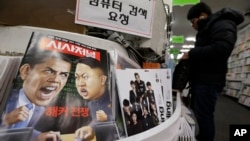U.S. experts have expressed mixed opinions about a congressional proposal that would broaden sanctions against North Korea.
The legislation, co-sponored by members of both major parties in the House of Representatives, was proposed this month in response to the North’s alleged cyberattack on Sony Pictures and the country’s apparent unwillingness to abandon its nuclear weapons program.
The bill calls for tightening sanctions against Pyongyang by denying it access to hard currency. The legislation also targets countries and companies that help the communist country in development of nuclear weapons.
The House measure follows President Barack Obama’s action to impose fresh sanctions on Pyongyang over the cyberattack. In January, Obama signed an executive order authorizing the Treasury Department to impose financial measures on 10 North Korean officials and government agencies. However, some argued that there was room for more action against Pyongyang.
Joshua Stanton, a Washington attorney and blogger who helped draft the legislation, said the current U.S. sanctions against the Kim Jong Un regime were not as comprehensive as they could be.
“Despite North Korea's long history of money laundering, counterfeiting and other illegal activity, it hasn’t been designated as a Primary Money Laundering Concern," Stanton said in an interview with the VOA Korean service. “The U.S. maintains comprehensive financial sanctions and licensing requirements for transactions with Iran, Syria and other countries, but not North Korea."
Stanton said Obama’s action was not powerful enough, noting that it “has only designated 10 low-level arms dealers.”
Other observers have said the president’s order was sufficient, given that the North is already coping with multiple international sanctions.
Some experts questioned the efficacy of the House bill, saying it could affect legitimate dealings.
“I don’t know how effective they are, but I am not against it," said John Merrill, former chief of the Northeast Asia Division of the Bureau of Intelligence and Research at the State Department. "The broader the sanctions become, it becomes harder to call it. Sanctions can often lead to economic warfare, and we have to be very careful of weaponization of sanctions.”
Merrill said Washington should enforce its sanctions against Pyongyang in relative proportion with other interested parties.
“If we [the U.S.] are by ourselves, without consideration of South Korea, China, Japan or even European countries, it’s a little bit strange,” he said.





